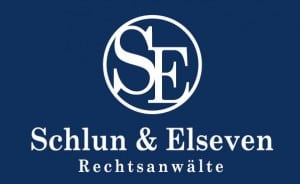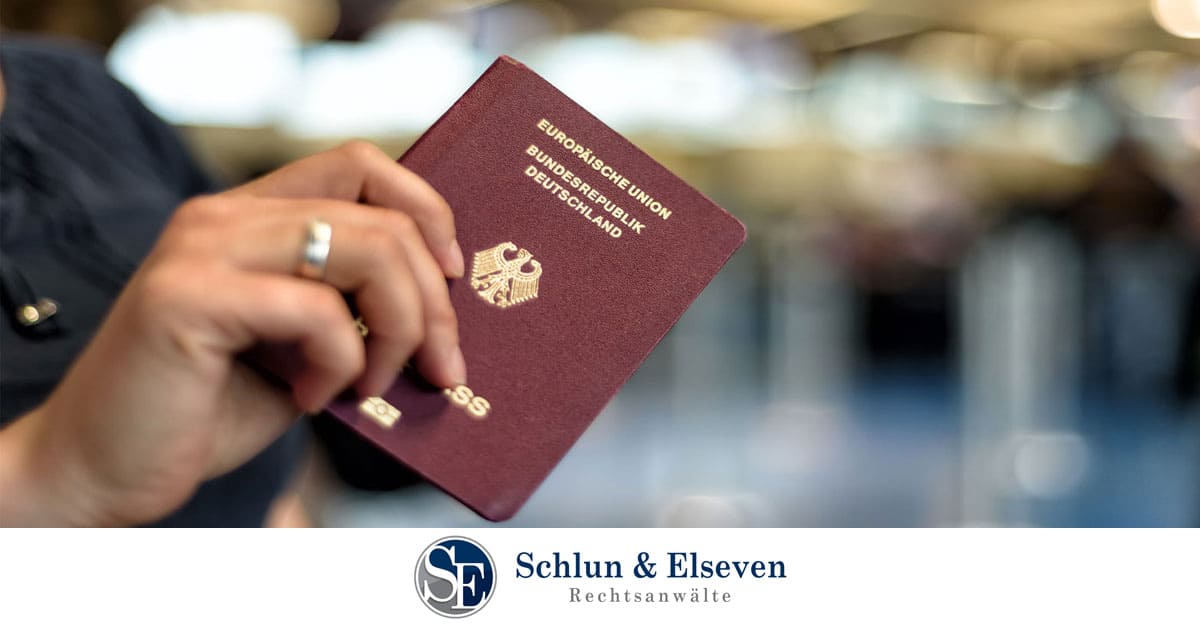Are you a highly qualified employee and want to work in Germany? Or, as a company based in the European Union, do you want to hire highly skilled workers from third countries?
The EU Blue Card is considered an established route into the German employment market. This residence title enables companies to recruit newly qualified workers promptly. This is particularly relevant regarding the shortage of skilled workers such as doctors, engineers or IT specialists. In detail, however, problems can arise during the transfer, especially in connection with Section 18b of the Residence Act (AufenthG), which serves as the legal basis for acquiring this residence title.
The German law firm Schlun & Elseven Rechtsanwälte offers skilled legal assistance to enable our clients to work in Germany. Our lawyers have in-depth residence law expertise and many years of experience supporting application procedures. They will be happy to take care of the entire application process for your EU Blue Card and clarify all outstanding issues with the relevant authorities so that you can fully concentrate on your core tasks.
The Benefits of the EU Blue Card
There are many advantages to holding an EU Blue Card. Firstly, it allows the holder to live and work in Germany (other European countries) for up to 4 years or the duration of the employment contract plus an extra three months. Although the EU Blue Card is not a permanent residence permit, it is possible to apply for a permanent residence permit after 21 months if the cardholder can demonstrate a B1 level of German. Without the B1 level of German, they can apply after 33 months.
Another bonus of the EU Blue Card is that there is no requirement for the applicant or their family members to have German language skills. Having German abilities is a bonus for living in Germany, but it is not considered a prerequisite of obtaining the card. As shown above, there are advantages of learning German for the permanent residence permit application.
Furthermore, the EU Blue Card allows for family reunification in Germany. The cardholder can bring some family members, including their spouse, their children, and others dependent on the holder (including step-children), to Germany. This dependency must be proven in the case of children over the age of 21. If you require advice on the eligibility of certain family members, please contact our office directly.
Applying for the EU Blue Card
The EU Blue Card can be applied in Germany at the applicant’s local Ausländerbehörde (immigration office). Most applicants need to apply for a German Employment Visa from a German Embassy or Consulate before coming to Germany. This visa demonstrates to the German authorities that you have entered the country legally and with the intention of working. There is a three-month window in which to apply for the EU Blue Card. Citizens from the USA, Canada, Japan, Australia, Israel, South Korea, and New Zealand can apply beforehand without getting an employment visa.
Here is a list of the documents which need to be submitted when applying for the EU Blue Card for Germany:
- Your passport.
- A recent biometric picture of yourself.
- The application form.
- Declaration on the Employment Relationship.
- Your original employment contract or job offer.
- Proof of your residence in Germany.
- University or college diploma, in the original.
- For those with statutory health insurance:
- The electronic health card
- A recent confirmation of health insurance
- If you have private health insurance:
- A certificate from the health insurance company stating your insurance details.
- Proof of contribution payments.
Document requirements vary depending on your employment situation and other factors. At Schlun & Elseven Rechtsanwälte, our immigration lawyers will oversee your application and guide you through the bureaucratic requirements for your specific application.
Changing Employer as an EU Blue Cardholder
The EU Blue Card protects in the case of a change of employer in Germany. The need to change employment can arise for many reasons, and it is permitted under the rules of this residence permit. Following changes to the EU Blue Card in November 2023, holders of the EU Blue Card must inform immigration authorities of any change in employer or position within the initial 12 months of employment. Authorities will have 30 days to decline the request to change employers or positions. This requirement has been changed from the initial necessity to do after a change in job after two years.
Following 12 months of employment under the EU Blue Card, cardholders will be free to switch employers or positions without the requirement to notify immigration authorities.
EU Blue Card holders and their family members can move to a second Member State based on simplified mobility rules after 12 months of employment in the first Member State. Periods working in different Member States will also be considered, facilitating more accessible access to the EU long-term resident status.
Legal complications can and often do arise in such cases, and at Schlun & Elseven Rechtsanwälte, our immigration lawyers will advise you in your case relating to changing employer as an EU Blue Cardholder.
EU Blue Card Legal Issues
There are several risks that EU Blue Cardholders can face, especially as the residence permit is closely connected to the person’s employment. If they lose their job, the EU Blue Cardholder has three months to find a new job. This new job should also fulfil the requirements for the residence permit. Should the individual find themselves unemployed after three months, they may face having their EU Blue Card withdrawn. Such an event may lead to them needing to leave Germany.
The responsible authorities can also withdraw the EU Blue Card from the holder in certain limited circumstances. Firstly, if they no longer meet the necessary conditions for the residence permit. Not meeting the requirements can include becoming unemployed or changing jobs to one that does not provide the required salary. Secondly, where the authorities can show that your application was based on false information and false or misleading documents. Thirdly, the individual has been deemed a potential threat to public policy, security, or public health. Finally, in cases where the individual does not have the necessary financial resources to maintain themselves and their family members without social assistance.
In such circumstances, it is crucial to contact an experienced immigration lawyer.
Another risk that often appeared during the Coronavirus pandemic was overstaying the residence permit. Overstaying a visa can lead to significant problems and even require the individual to leave Germany. However, by consulting with our legal team, they can advise you regarding options available, such as permanent residency, a second EU Blue Card and whether it is possible to get an extension to the visa. Our team has helped clients worldwide in all legal matters relating to the EU Blue Card.
Family Reunification and the EU Blue Card
Family reunification is one of the significant advantages of the EU Blue Card. EU Blue Cardholders can apply for family reunification with their spouse or registered partner, children under 18, adult children dependent on you due to health conditions or disabilities and dependent parents. Family reunification is possible for researchers and highly qualified workers with an EU Blue Card. The family member will be able to stay in Germany for the duration of the EU Blue Card’s validity.
However, there are specific conditions for EU Blue Cardholders that they need to meet to be able to apply for it:
- Ability to support their family members financially,
- Hold an employment contract that is valid for at least another year,
- Have accommodation with sufficient space for those family members,
- Possess proof that the persons are related to them with the relevant documents.
Applications can be made at the German Embassy or Consulate in the country of residence.
When applying for family reunification, it is essential to possess the necessary documents, which can vary depending on the circumstances of the case and the nature of the family relationship. The documents needed include:
- Marriage certificate (for spouses),
- Birth certificates (for children),
- Proof of long-term relationship (for unmarried partners),
- Proof of health insurance,
- Proof that your family members do not pose a risk to the public policy, security or health of the hosting state:
- Health certificates
- Police clearance certificates
- Passports.
The EU Blue Cardholder also needs to provide proof of their passport (a copy), the EU Blue Card itself and evidence that they have the necessary accommodation and finances to support their family member(s).
At Schlun & Elseven Rechtsanwälte, our lawyers have supported clients globally in all matters relating to the EU Blue Card. As part of our package, our lawyers can oversee the collection of documents and determine which apply to the specific case, apostille or legalise them accordingly, prepare family members for the interview and discussions with the German embassy or consulate and generally manage the application process.
Having successfully navigated the application process, your family members will benefit from what family reunification has to offer, including:
- Possessing a residence permit (or residence permits) that match the duration of the EU Blue Card,
- Being able to work without salary restriction and without applying for a work permit,
- Not needing a language proficiency exam to stay in Germany,
- Freedom to travel between the Schengen states for up to 90 days within any six-month period.
Should your family members stay long enough in Germany, they can seek to become permanent residents and even German citizens based on their residency. At Schlun & Elseven Rechtsanwälte, our immigration and citizenship experts can guide our clients through these processes.

Practice Group: German Business Immigration Law
Practice Group:
German Business Immigration Law
Contact our Lawyers for German Immigration Law
Please use our online form to outline your request to us. After receiving your request, we will make a brief initial assessment based on the facts described and provide you with a cost offer. You can then decide whether you would like to engage our services.














